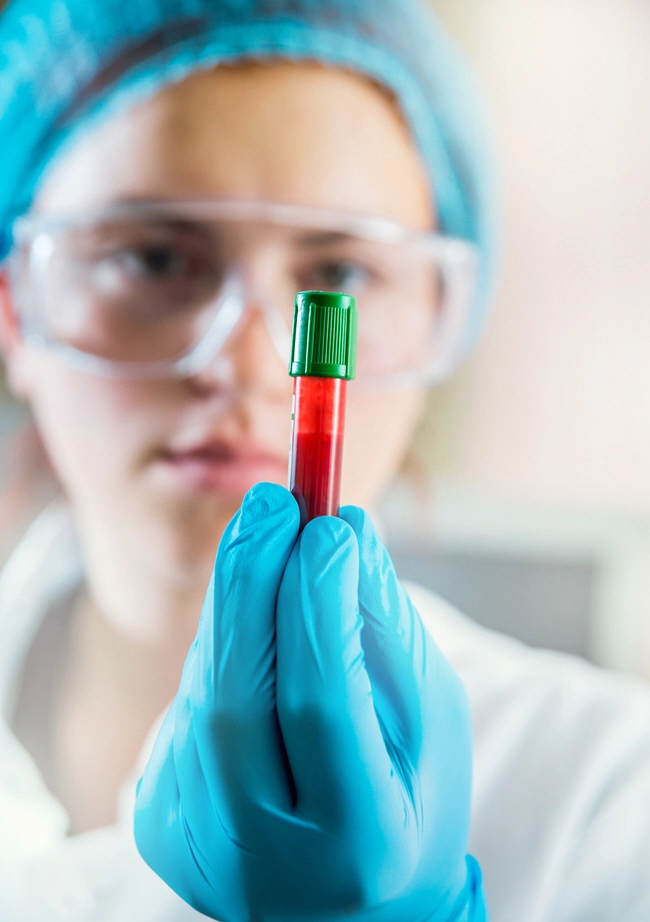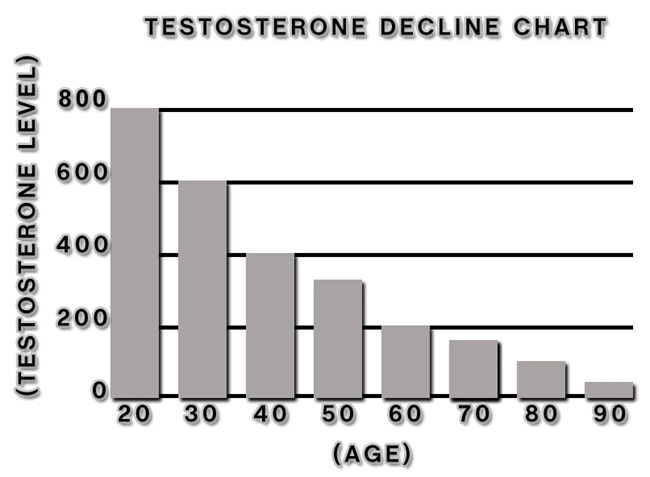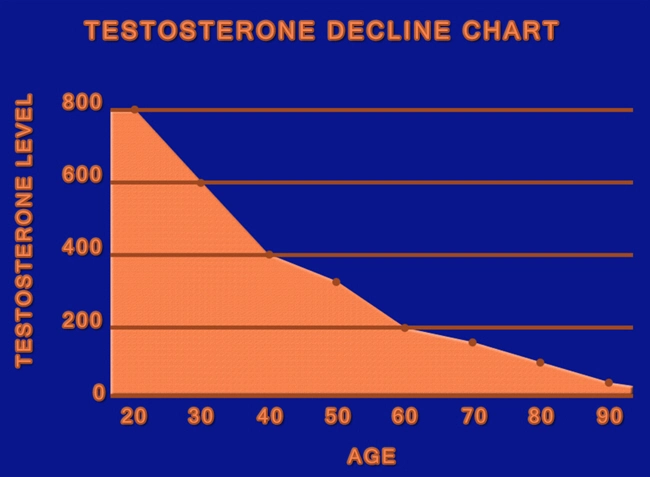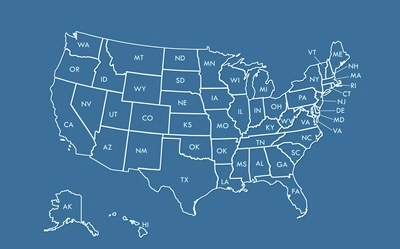
Video Link: https://vimeo.com/291315756
Video Download: Click Here To Download Video
Video Stream: Click Here To Stream Video
Video Link: https://vimeo.com/291315836
Video Download: Click Here To Download Video
Video Stream: Click Here To Stream Video
Men are Also Afflicted with this Troublesome Condition
Experts are convinced men go through an equivalent of menopause due to a drop in testosterone during their middle age.
As we get older, our levels of sex  hormones decline.
hormones decline.
In women, this leads to menopause. But do men go through a male equivalent as their testosterone drops?
Some experts (and many men themselves) believe the answer to that question is a loud, resounding “YES.”
The cause? A precipitous drop in testosterone, which results in a broad range of middle-age problems:
- Little energy
- Loss of mental sharpness and increased brain fog
- Weakened, flabby muscles
- Increase in fat, at times leading to “man boobs.”
- Irritability
- Diminished libido and inability to perform sexually
- And more...much more, too numerous to mention
As a result of these conditions, a growing number of researchers believe that many men, perhaps one in five over the age of 50, should have testosterone replacement therapy (TRT) to restore their vigor and well-being.
In fact, TRT is gaining ground and, over the past decade, prescriptions for testosterone gels and injections have doubled, skyrocketing to more than 300,000 a year.
But the Issue Remains Contentious
Hormone experts insist that the rising popularity of male TRT is nothing more than a direct result of the barrage of aggressive advertising by the pharmaceutical industry.
In the U.S., where drug companies can advertise directly to the public, men spend nearly 4 billion a year on testosterone.
This is in spite of the lack of data on its long-term safety, and the fact that the treatment is not always 100% effective.
Some symptoms don’t always improve, says Dr. Richard Quinton,  consultant endocrinologist at the Royal Victoria Hospital in Newcastle upon Tyne, England.
consultant endocrinologist at the Royal Victoria Hospital in Newcastle upon Tyne, England.
For most men, the symptoms attributed to low testosterone and male menopause are actually ‘normal signs of unhealthy aging,' says Professor Fred Wu, director of the Andrology Research Unit in Manchester, England.
Low Testosterone Suggests that Maybe You Haven’t Been Looking After Yourself
Professor Wu points out that obese men with low testosterone frequently find their levels bounce back when they lose weight.
‘It’s the same when patients control their diabetes,’ he says.
 Other factors that can affect testosterone levels include "depression and excessive drinking," adds Professor Gary Wittert, head of medicine at the University of Adelaide, Australia.
Other factors that can affect testosterone levels include "depression and excessive drinking," adds Professor Gary Wittert, head of medicine at the University of Adelaide, Australia.
"Low testosterone is usually — though not always — caused by changes in a man’s physical and mental health and lifestyle that commonly occur as they age."
No Agreement About What Level of Testosterone is ‘Unhealthy.'
Levels can vary over a lifetime, and even within the day. The normal range can be anything from 10.4 to 41.6 nmol/L (nanomoles per liter of blood).
"It’s virtually impossible to say what is a healthy level of testosterone," says Marian O’Connor, a senior lecturer in psycho-sexuality at the Tavistock Centre for Couple Relationships in London.
"A man can be healthy and sexually active while having a relatively low testosterone level."
So while a large number of middle-aged men may have low testosterone, many hormone specialists insist that only a fraction, perhaps two in 100, need treatment, and that’s because they have a legitimate disorder: hypogonadism (where the testicles don’t produce testosterone as a result of disease or damage).
This idea has been endorsed by the U.S. Food and Drug Administration (FDA), which this month announced that testosterone products must now carry a warning about the "possible increased risk of heart attacks and stroke."
Manufacturers must also spell out that the medication is approved "only for men who have low testosterone levels due to disorders of the testicles, pituitary gland or brain that cause hypogonadism."
The FDA said it was aware that testosterone is used by some "for no apparent reason other than aging, and the safety of this use has not been established."
But Not Everyone Shares These Worries
Official European guidelines, issued four months ago, insist there’s "no consistent evidence of an increased risk of heart problems with testosterone  medication."
medication."
And British doctors who use testosterone for patients with sexual problems — notably low libido and erectile dysfunction — believe male TRT can play a significant role in the well-being of many older men.
"Testosterone replacement therapy is both safe and efficient in treating symptoms such as erectile dysfunction in men with low testosterone," says Dr. Geoffrey Hackett, a sexual health specialist at Good Hope Hospital in Birmingham and a former chair of the British Society for Sexual Medicine.
He believes the term "male menopause" is "not entirely accurate," adding: "After all, only 20 per cent of men experience low levels of the hormone, whereas 100 per cent of women go through menopause."
But he says that low testosterone is a real issue for many men, adding: "I’d like to see screening for testosterone in all men over 50.
"Above all, what is important is for doctors to recognize that testosterone treatment should be considered for anyone with low levels who also has sexual dysfunction symptoms."
And if you’re one of the one in ten men over 50 in England who has type 2 diabetes, or one in four in the U.S (in Scotland it’s one in three), he says you, too, could benefit from testosterone treatment.
"Nearly half of men with type 2 diabetes have low testosterone, and many suffer sexual dysfunction," says Dr. Hackett.
 "Low testosterone is not the only reason for this — they will probably also suffer from circulation problems, for instance.
"Low testosterone is not the only reason for this — they will probably also suffer from circulation problems, for instance.
"But we know testosterone helps. And as there’s no real evidence that it’s not safe, why not give these men treatment that will improve their lives?"
The debate over male menopause and testosterone may be resolved by a major Australian study due to be published in 2019.
It is tracking 1,500 men, aged 50 and over, who are obese and at risk of developing diabetes.
All are being given access to a Weight Watchers program, while half will also receive a regular dose of testosterone.
One aim of the study is to see if taking testosterone helps men lose weight.
Another is to find out whether TRT for men is safe. So far there has been no reason for concern.
How Lifestyle Changes Can Help
For most men, the best treatment for low testosterone levels is switching to a healthy way of life, says Professor Fred Wu, a consultant endocrinologist at Central Manchester University Hospitals.
"We get a lot of referrals from men who wrongly believe their mid-life symptoms are solely due to age-related low testosterone.
"This age-related decline in  testosterone starts at about 35 or 40, but it’s very slow. It’s very much influenced by health and body weight."
testosterone starts at about 35 or 40, but it’s very slow. It’s very much influenced by health and body weight."
Lose weight: This is the single most effective lifestyle change for boosting testosterone levels.
Shedding 10 per cent of your weight — shown to be achievable with regular exercise, a healthy diet and cutting back on alcohol — raises testosterone levels by around four nmol/L, according to the European Male Aging Study in 2013.
"So, if you have moderately low testosterone, lifestyle change alone can make your levels healthy," says Dr. Mathis Grossmann, a consultant endocrinologist and head of men’s health at Austin Hospital in Melbourne, Australia.
The more weight you lose, the better your hormone recovery, he adds.
"The impact is greatest the younger and fatter you are.
 "But older men can benefit, too.
"But older men can benefit, too.
"Once weight loss has started, there’s an immediate rise in testosterone that triggers further weight loss, which then raises hormone levels still further."
U.S. research has recently shown how testosterone instructs stem cells, which can turn into any cell, to become muscle.
"Having more muscle creates a leaner physique and greater strength, as well as boosting energy and making the body burn calories more efficiently," says Dr. Grossmann.
Exercise: You don’t need to be a fitness freak. "A brisk walk every other day is all that’s needed," says Dr. Quinton.
Control diabetes: It’s not clear which comes first, the low testosterone or diabetes.
But some research suggests low testosterone can reduce the effectiveness of insulin, the hormone that regulates blood glucose levels.
A small number of doctors believe that testosterone should be considered as a treatment for type 2 diabetes in older men.
However, a major study, published last year in the journal Diabetes Care, found that this treatment didn’t improve the body’s inability to turn sugar into fuel, which is a leading cause of diabetes.
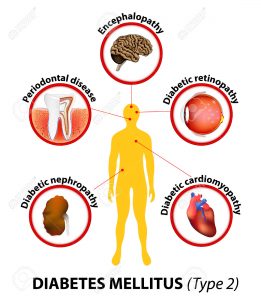
Men with type 2 diabetes are twice as likely to suffer from low testosterone, and some research suggests it can reduce the effectiveness of insulin, the hormone that regulates blood glucose levels.
Get to bed: The more you sleep, the more testosterone your body produces.
Research shows that severe sleep deprivation can cause testosterone levels to drop by 70 percent.
Indeed, men who get only four hours of sleep a night have 60 per cent less testosterone in their blood compared to when they get eight hours.
Beware of drug side effects: Testosterone levels can be affected by a range of medications, including beta-blockers, opioid analgesics such as morphine, steroids such as prednisolone (used for skin diseases and osteoarthritis), and some epilepsy drugs.
"If you’re experiencing issues with libido and erections since starting any of these medications, your doctor may help you find an alternative," says Dr. Quinton.
"Sometimes there is none. In that case, it makes sense to have testosterone replacement."
What About Male Testosterone Replacement Therapy?
Some experts (and men) swear by male TRT. But you’re unlikely to get it unless you have hypogonadism.
A handful of private clinics will prescribe it by a single blood test if these show low levels of the hormone.
But under recent guidelines from the FDA, your levels should be checked several times over six months before you get testosterone treatment.
"While problems of sexual function are common in men, persistent problems lasting for longer than six months are much rarer," according to these guidelines.
Men with sexual problems and a testosterone level lower than 12 nmol/L should be considered for treatment, a long with men with diabetes, osteoporosis, a history of heart disease or stroke, erectile dysfunction, or depression whose levels are low.
Men with a reading below eight nmol/L should be treated.
Testosterone supplements should never be taken by men with prostate cancer, heart failure, or heart disease because there is some evidence that it can make them worse.
And one study suggested that older men who start taking testosterone in their late 60s may have a raised risk of a heart attack or stroke.
But there are also several studies that arrived at the exact opposite conclusion, so be sure to discuss this thoroughly with your physician.
Testosterone supplements also act as a contraceptive, so they should not be taken by men wanting to start a family.
There are several ways of taking testosterone, including pills, patches, and implants placed under the skin during an outpatient procedure.
However, the newer gels and intramuscular injections are "far superior," according to Dr. Quinton.
The gels are rubbed daily into the shoulders, underarms, and thighs where they are most readily absorbed into the bloodstream.
The injections are delivered every three months or so, either into the leg muscles or the muscle in the bottom; the hormone is then slowly released by the muscle into the body.
Gels have the advantage of providing a daily dose of testosterone in the same way as the body produces it naturally.
But they’re absorbed into the blood stream quite slowly so you shouldn’t shower or swim for six hours after application.
Injections mean you avoid the hassle of remembering to apply the gel every day.
The downside is that levels of testosterone can tail off towards the end of the three-month period.
Can I Get a Hormone Test from my Physician?
In theory, it should be available. First, men should be given a blood test if they have symptoms of low testosterone such as low libido, impotence, muscle weakness, and depressed mood.
The test is given before you’ve had breakfast because testosterone levels change during the day (peaking in the early morning) and are affected by food intake, stress, and fatigue.
If your levels are low, you should be examined by a hormone specialist (an endocrinologist) for possible treatment.
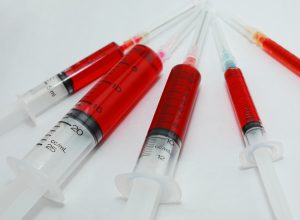 Most guidelines say that any man with testosterone below eight nmol/L should then be treated.
Most guidelines say that any man with testosterone below eight nmol/L should then be treated.
"Unfortunately, this is not always straightforward; men who ask their GP for a blood test may well be told that there’s nothing to worry about," says campaigner Nick O’Hara Smith, who set up the website androids.org.uk after missing out on testosterone treatment following double testicular cancer.
Signs that your Testosterone Levels are Low
If you have one or more of the following symptoms, consider asking your doctor for a blood test:
- Sex problems — loss of libido; issues with erections even when taking Viagra. Testosterone is the leading cause of sexual desire, which Viagra can’t help. "Drugs such as Viagra treat only a symptom — Testosterone also improves the ability to orgasm and overall satisfaction," says Dr. Geoffrey Hackett, professor of men’s health at Bedfordshire University.
- Hot flashes and night sweats
- Increased flab, and man boobs. As testosterone levels fall, the pituitary gland in the brain responds by trying to make the testicles produce more.
- "This comes at the cost of also making a lot more estrogen," says Dr. Richard Quinton, consultant endocrinologist at the Royal Victoria Hospital in Newcastle upon Tyne. That means man boobs and sometimes hot flashes.
- Constant fatigue and muscle weakness. Testosterone is essential for maintaining muscle and bones as well as generating energy.
- Loss of self-confidence, depression, lack of drive, lethargy; anger, and anxiety. Testosterone plays a crucial role in men’s energy, mood, confidence, and memory. "The impact of low testosterone is catastrophic," says campaigner Nick O’Hara Smith of the website androids.org.uk.
 He speaks from hard, bitter experience, having had to wait weeks for testosterone treatment following double testicular cancer.
He speaks from hard, bitter experience, having had to wait weeks for testosterone treatment following double testicular cancer.
"I tried to kill myself. I had lost my mind before I was able to start my therapy." He hears many stories of "marriages all going by the board as men struggle to regain their health."
Remember, there is no need to continue to suffer from the debilitating effects of aging. Call our clinic for a FREE, no-obligation discussion of what Testosterone Replacement Therapy can do for you.
References
https://www.webmd.com/men/features/menopause-not-just-for-women#1
https://www.menshealthboston.com/pdf/2014_Death-by-Testosterone-We-Think-Not.pdf
Contact Us Today For A Free Consultation
Dear Patient,
Once you have completing the above contact form, for security purposes and confirmation, please confirm your information by calling us.
Please call now: 1-800-380-5339.
Welcoming You To Our Clinic, Professor Tom Henderson.

- LabCorp Announces a Change to the Testosterone Reference Range [Last Updated On: April 16th, 2025] [Originally Added On: June 23rd, 2019]
- Important Facts About Testosterone Therapy Before Buying [Last Updated On: April 18th, 2025] [Originally Added On: July 13th, 2019]
- Soy: Does it Lower Testosterone? [Last Updated On: October 18th, 2024] [Originally Added On: August 30th, 2020]
- Testosterone Treatments May Successfully Reverse Type-2 Diabetes in Some Men [Last Updated On: April 15th, 2025] [Originally Added On: November 13th, 2020]
- Testosterone Replacement Therapy (TRT) May Prevent Heart Attacks and Diabetes [Last Updated On: April 21st, 2025] [Originally Added On: November 17th, 2020]
- Did You Know? Recent Studies Have Confirmed the Link Between Low Testosterone (“Low-T”) and Depression. [Last Updated On: April 17th, 2025] [Originally Added On: January 10th, 2021]
- New Study Finds Testosterone Does Not Increase Your Heart Attack Risk [Last Updated On: April 14th, 2025] [Originally Added On: January 11th, 2021]
- The Great Testosterone Debate [Last Updated On: April 20th, 2025] [Originally Added On: January 14th, 2021]
- Testosterone Replacement Therapy Lowers Heart Attack Risk [Last Updated On: April 19th, 2025] [Originally Added On: January 18th, 2021]
- New Study Says: The Benefits of Testosterone Replacement Therapy Outweigh The Risks [Last Updated On: April 22nd, 2025] [Originally Added On: January 19th, 2021]
- Male Menopause. Fact or Fiction ? [Last Updated On: April 23rd, 2025] [Originally Added On: January 20th, 2021]
- Testosterone: How Much Do You Really Know About This Masculine Hormone? [Last Updated On: October 6th, 2024] [Originally Added On: February 9th, 2021]
- Low-T: What are healthy levels of Testosterone and why is it difficult to measure? [Last Updated On: September 11th, 2025] [Originally Added On: April 3rd, 2021]
- Testosterone Therapy May Be Good for the Heart if You Have Low-T [Last Updated On: May 3rd, 2025] [Originally Added On: July 21st, 2021]
- A Recent Study Concludes: Testosterone DOES NOT Cause Prostate Cancer [Last Updated On: September 14th, 2025] [Originally Added On: August 16th, 2021]
- In the Battle Against Aging, When do the Risks Outweigh the Rewards? [Last Updated On: April 4th, 2025] [Originally Added On: August 18th, 2021]
- New Study Concludes: Boosting Testosterone Levels Lowers Men's Death Risk [Last Updated On: May 11th, 2025] [Originally Added On: August 20th, 2021]
- Testosterone Replacement Therapy Slows Prostate Cancer! [Last Updated On: April 2nd, 2025] [Originally Added On: September 13th, 2021]
- Research proves that Testosterone Therapy Boosts Fertility! [Last Updated On: April 5th, 2025] [Originally Added On: September 26th, 2021]
- Free Testosterone and Sex Hormone-Binding Globulin [Last Updated On: April 6th, 2025] [Originally Added On: October 15th, 2021]
- Testosterone Does Not Cause Heart Attacks [Last Updated On: April 7th, 2025] [Originally Added On: October 15th, 2021]
- Testosterone and Women [Last Updated On: April 8th, 2025] [Originally Added On: October 15th, 2021]
- Testosterone and Metabolic Syndrome [Last Updated On: April 3rd, 2025] [Originally Added On: October 15th, 2021]
- Testosterone and Disease Prevention [Last Updated On: March 31st, 2025] [Originally Added On: October 15th, 2021]
- Judge Vacates $140 Million Verdict in Testosterone Lawsuit [Last Updated On: April 1st, 2025] [Originally Added On: October 15th, 2021]
- Testosterone and Estrogen [Last Updated On: April 9th, 2025] [Originally Added On: October 16th, 2021]
- Testosterone and Aging [Last Updated On: April 10th, 2025] [Originally Added On: October 16th, 2021]
- Testosterone Replacement Therapy (TRT) Benefits [Last Updated On: April 11th, 2025] [Originally Added On: October 16th, 2021]
- Testosterone Battles Obesity [Last Updated On: March 29th, 2025] [Originally Added On: October 16th, 2021]
- Why You Need Testosterone Replacement Therapy [Last Updated On: May 14th, 2025] [Originally Added On: October 16th, 2021]
- Testosterone FAQ's [Last Updated On: May 13th, 2025] [Originally Added On: October 25th, 2021]
- How Testosterone Impacts Sexual Preferences In Men and Women [Last Updated On: March 28th, 2025] [Originally Added On: October 30th, 2021]
- Growth Hormone and The Thyroid Gland [Last Updated On: April 24th, 2025] [Originally Added On: November 19th, 2021]
- How Does Masturbation Affect Testosterone Levels? Exploring the Science [Last Updated On: May 24th, 2025] [Originally Added On: March 27th, 2022]
- Testosterone Therapy Increasingly Used to Help Men Take Control of Aging [Last Updated On: May 25th, 2025] [Originally Added On: May 30th, 2022]
- The many benefits of Testosterone Replacement Therapy (TRT) [Last Updated On: November 1st, 2025] [Originally Added On: June 13th, 2022]
- Tlando Testosterone - A Brand New Way to Treat Low-T Safely with a Testosterone Pill [Last Updated On: May 28th, 2025] [Originally Added On: July 12th, 2022]
- Safe Tlando Testosterone Changes Landscape of Low-T Therapy [Last Updated On: May 30th, 2025] [Originally Added On: August 15th, 2022]
- Systems to Monitor Testosterone Replacement Therapy (TRT) [Last Updated On: October 12th, 2025] [Originally Added On: September 21st, 2022]
- Testosterone May Help You Keep Your Job (Or Find Another) [Last Updated On: June 12th, 2025] [Originally Added On: October 4th, 2022]
- Toxic Chemicals are Killing your testosterone…And your Manhood! [Last Updated On: October 28th, 2024] [Originally Added On: October 10th, 2022]
- A new study reveals that Testosterone improves body composition in men with low testosterone! [Last Updated On: October 22nd, 2025] [Originally Added On: October 17th, 2022]
- A former Mr. Olympia speaks about testosterone [Last Updated On: October 10th, 2025] [Originally Added On: November 8th, 2022]
- Testosterone Blockers Thwart Melanoma [Last Updated On: June 9th, 2025] [Originally Added On: December 11th, 2022]
